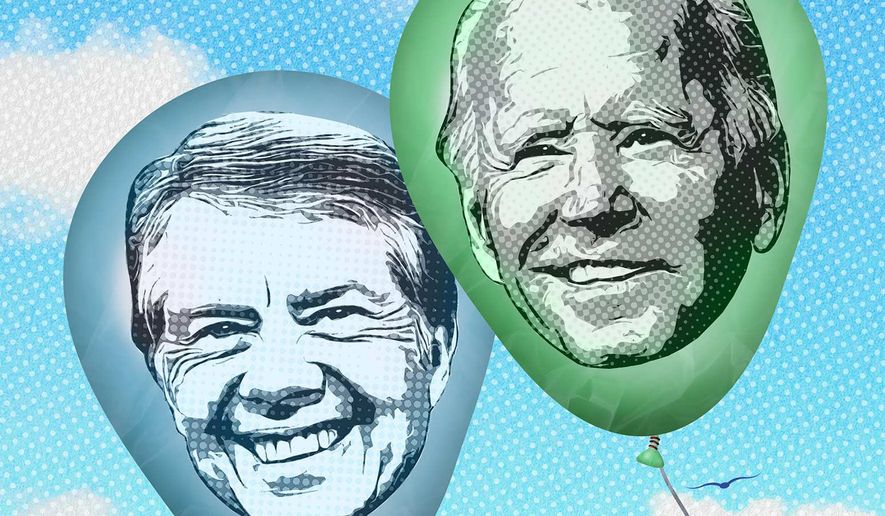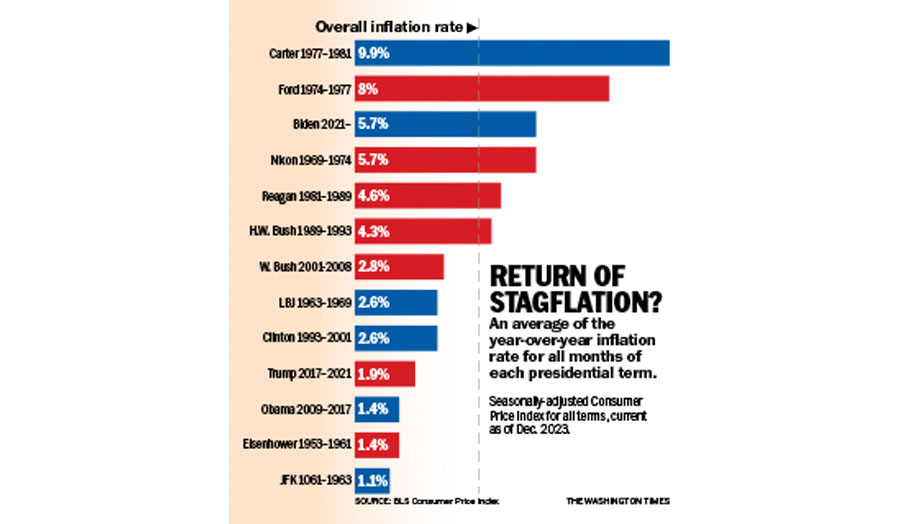OPINION:
A version of this story appeared in the On Background newsletter from The Washington Times. Click here to receive On Background delivered directly to your inbox each Friday.
Everything happening in our fractured nation today seems so worrisomely reminiscent of America’s last lost decade — the 1970s.
For those who don’t remember, the late 1970s under part-time President Gerald Ford and then, much worse, under President Jimmy Carter, were one economic and national security setback after another.
The witches’ brew of 7% to 10% inflation by 1979 and ever-increasing tax rates — which rose as high as 70% — drove the economy into a ditch. Real family incomes cratered under Mr. Carter because inflation rose so much faster than take-home pay. Interest rates soared, and homes became unaffordable. Gasoline prices tripled. Mr. Carter blamed Big Oil and “invested” in pipe-dream green energy alternatives that went bankrupt.
Every time inflation rose, the economic whiz kids in Washington assured us the high prices were just temporary. (They didn’t use the term “transitory.”) When prices kept rising, Mr. Carter blamed corporate greed and installed price controls and windfall profits taxes — which only made problems worse. Mr. Carter had the worst record of inflation in modern times. President Biden is right behind him.
We saw student protesters occupying the offices of college presidents. Race riots turned our inner cities into powder kegs.
Because America was so weak at home, our enemies abroad capitalized as Soviet tanks rolled into Afghanistan and troops into Nicaragua, and Iran held Americans hostage.
Federal spending and debt soared, and the private sector started shrinking.
His response to the bad news was not to point the finger at Americans and lecture them to turn down the thermostat, put on a sweater, or learn to live with less. (Even Mr. Carter didn’t threaten to abolish air conditioning and gas heat.)
Interest rates on mortgages skyrocketed to 17%, and buying a home became financially out of reach for most Americans.
The new term that slid into the American lexicon was “stagflation.” The term refers to the combination of high prices and sluggish economic growth.
Does any of this sound familiar?
Mr. Biden’s prescription for the U.S. economy isn’t to reverse course. It is Carterism on steroids. More price controls, higher taxes on the rich and businesses, $2 trillion more in spending on programs like student loan “forgiveness,” green energy subsidies, and mortgage relief programs.
The tax rate on investment would soar well above 50%. As former Trump economist Larry Kudlow has put it: “Biden thinks he can tax America to prosperity.”
On energy policy, he’s doubling down on his commitment to “net zero” fossil fuel production and will command people to buy $70,000 electric vehicles made in China.
When most Americans say they are financially worse off, he doesn’t feel their pain. He shames them for not appreciating the wonderful things he’s done and the virtues of “Bidenomics.”
That message is a little tone-deaf, given that Americans are worried about ’70s-style stagflation making a comeback. Inflation is trending back up, while growth in gross domestic product just slowed to a 1.6% trickle.
Mr. Biden’s response is that Americans are unappreciative, and we are all selfish for not wanting to live with less and giving up our gas stoves and SUVs to save the planet.
In his famous “malaise speech” in the summer of 1979, Mr. Carter spoke of a national “crisis of confidence,” and he lectured Americans about too much “self-indulgence” and learning to consume less and conserve more. He even talked about “threats to democracy.” Instead of inspiring the nation, he put the country in a funk.
Like Jimmy Carter, President Biden offers four more years of austerity, sacrifice, and bigger, more intrusive government. That platform won the incumbent Jimmy Carter 41% of the vote in 1980.
• Stephen Moore is a senior fellow at The Heritage Foundation and a co-founder of the Committee to Unleash Prosperity. He serves as an economic adviser to the Trump campaign.





Please read our comment policy before commenting.